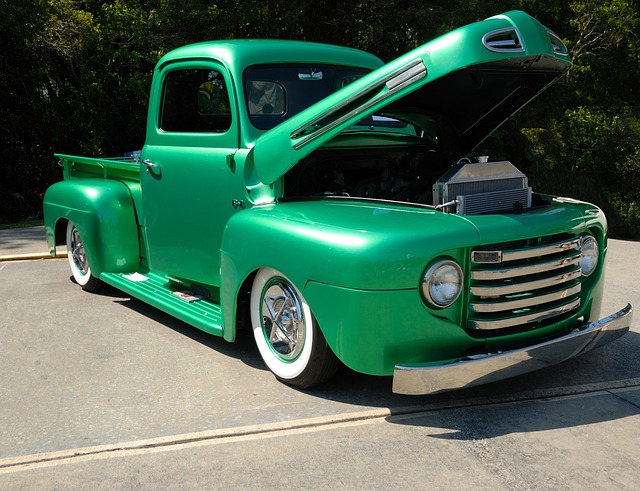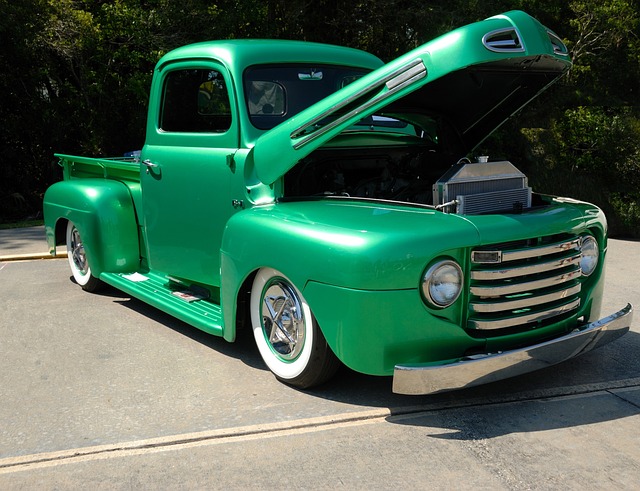During winter, truck batteries face challenges due to reduced chemical reaction rates and higher risk of sulfation from thickened electrolyte viscosity. To maintain battery health and reliability in cold conditions, it's crucial to use chargers designed for low temperatures, which offer higher output and incorporate temperature compensation algorithms. Selecting a high Cold Cranking Amps (CCA) rated truck battery, regular maintenance including cleaning terminals and ensuring proper insulation are key for optimal performance. Advanced smart charging systems with temperature sensors can adjust their output to maintain battery health and prevent freeze-related damage. These systems also provide real-time data for telematics integration, which aids in tailoring maintenance schedules and reducing the need for replacements or repairs. Truck operators should consider AGM or GEL batteries due to their superior cold-weather performance compared to traditional lead-acid models. Overall, proactive maintenance and smart charging solutions are essential for ensuring that truck batteries perform reliably throughout the winter season.
When winter’s bite threatens a fleet, safeguarding truck batteries becomes paramount. This article dissects the impact of cold weather on these critical power sources and offers robust solutions. From grasping the science behind battery performance in subzero conditions to exploring proactive maintenance strategies, we delve into the best practices for ensuring your truck batteries remain reliable. We compare different types of batteries suitable for cold environments, highlighting advanced charging systems designed for low temperatures. Furthermore, we provide insightful tips on handling these batteries during harsh winter periods. Whether you’re a fleet manager or a truck owner, this guide is your roadmap to maintaining optimal battery performance all year round.
- Understanding the Challenges of Truck Batteries in Cold Weather
- The Science Behind Cold-Weather Battery Performance in Trucks
- Proactive Maintenance Strategies for Maintaining Truck Battery Health in Winter
- Advanced Truck Battery Charging Systems Engineered for Low Temperatures
- Comparison of Lead-Acid vs. AGM/GEL Batteries for Cold Weather Use in Trucks
- Implementing Smart Charging Solutions to Extend Truck Battery Life in Winter Conditions
- Top Tips for Safe and Effective Truck Battery Handling During Cold Snaps
Understanding the Challenges of Truck Batteries in Cold Weather

In cold weather conditions, truck batteries face unique challenges that can impede their performance and longevity. The chemical reactions within lead-acid truck batteries slow down as temperatures drop, leading to decreased efficiency and a higher likelihood of not starting due to increased sulfation rates. This is because the viscosity of the electrolyte solution in the battery becomes thicker, which reduces conductivity and slows down the reaction kinetics necessary for power generation. As a result, the battery struggles to provide enough current to start the truck’s engine, especially when it’s cold. Truck owners and operators must be vigilant during these periods, ensuring that their batteries are well-maintained and charged to the recommended float voltage. Employing proper charging solutions tailored for cold weather can mitigate these issues by maintaining optimal battery temperature and providing a consistent charge that compensates for the reduced efficiency in low temperatures.
When selecting a charging solution for truck batteries in cold climates, it’s crucial to consider chargers designed with cold-weather performance in mind. These chargers often feature a higher output at lower temperatures, ensuring that the battery remains fully charged and capable of withstanding the harsh conditions. Additionally, they may include temperature compensation algorithms that adjust charging parameters to suit the ambient conditions. This not only helps in maintaining the health of the battery but also ensures that the truck’s electrical systems function reliably, which is critical for safety and operational efficiency. Regular inspections and proactive maintenance can further enhance the performance of truck batteries in cold weather, safeguarding against unexpected failures and ensuring that trucks are ready to perform when needed.
The Science Behind Cold-Weather Battery Performance in Trucks

Extreme cold weather poses unique challenges for truck batteries, which are integral components for vehicle operation. The chemistry within lead-acid truck batteries, a common type used in heavy-duty vehicles, can be adversely affected by low temperatures. When the ambient temperature drops, the viscosity of the battery’s electrolyte solution increases, leading to sluggish ion movement and reduced battery performance. This is due to the electrolyte’s higher resistance to flow at lower temperatures, which can prevent sufficient charging acceptance and reduce the battery’s capacity. Additionally, the lead plates within the battery become stiffer, which also hinders their ability to undergo the necessary reactions for energy storage and release. To mitigate these effects, it’s crucial to select truck batteries designed to perform reliably in cold conditions, often indicated by a ‘Cold Cranking Amps (CCA)’ rating that reflects their power output at freezing temperatures. Implementing proper battery maintenance, such as keeping the battery charged and insulated from the cold environment, can further ensure optimal performance even when ambient temperatures plummet. Understanding these scientific principles is key for truck owners and operators to select and maintain the right batteries for year-round reliability.
Proactive Maintenance Strategies for Maintaining Truck Battery Health in Winter

To safeguard your truck’s battery health during the harsh winter months, it’s crucial to implement proactive maintenance strategies. Engaging in regular inspections can reveal potential issues before they escalate. This includes checking the battery’s charge level, as cold temperatures can lead to a reduced ability to hold a full charge. Ensure the battery terminals are clean and free of corrosion, as this can impede the electrical connection and affect performance. Employing a battery warming system or an insulating battery box can mitigate the impact of frigid conditions on battery capacity. Optimal battery placement within the truck, where it is less exposed to extreme cold, is also beneficial. Pre-conditioning the battery with a trickle charger or a smart battery maintainer that’s designed for cold weather can prevent the detrimental effects of prolonged exposure to freezing temperatures. By taking these measures, you can significantly reduce the likelihood of unexpected battery failures during winter operations. Regular maintenance and the use of appropriate equipment can ensure your truck’s battery remains reliable, no matter how cold it gets outside.
Advanced Truck Battery Charging Systems Engineered for Low Temperatures

Truck batteries are subject to the demands of cold weather, which can significantly reduce their performance and lifespan. To address this challenge, manufacturers have developed advanced truck battery charging systems specifically engineered for low temperatures. These sophisticated systems are designed with temperature compensation algorithms that adjust the charging parameters to prevent overcharging or undercharging due to ambient conditions. They ensure optimal charging voltages and currents, which are critical for maintaining battery health in sub-optimal weather. Moreover, these systems often incorporate robust components and insulation to withstand extreme cold without performance degradation. This not only extends the life of the truck battery but also ensures that the vehicle operates reliably, even in harsh climates where temperatures can dip below freezing. The result is a charging system that minimizes the risk of battery sulfation and maintains consistent output power, which is essential for heavy-duty applications where trucks are often used in cold environments such as mining, construction, and long-haul transportation. Truck operators benefit from these advancements through increased reliability, longevity, and performance of their batteries, regardless of the weather conditions they face.
Comparison of Lead-Acid vs. AGM/GEL Batteries for Cold Weather Use in Trucks

When faced with cold weather, selecting the right truck battery becomes critical for ensuring vehicle performance and longevity. Lead-acid batteries have long been the conventional choice for heavy-duty trucks; however, their performance can degrade significantly in sub-optimal temperatures. The chemical reactions that lead to energy storage in these batteries slow down as they cool, resulting in reduced cranking amps and a diminished ability to start the engine promptly when needed. This can be particularly problematic for commercial truck operations where quick starts are essential.
In contrast, Absorbent Glass Mat (AGM) and Gel Cell (GEL) batteries offer superior performance in cold weather conditions. These advanced lead-acid batteries feature a specialized design that includes a non-liquid electrolyte solution, which provides consistent power output across a wide range of temperatures. AGM and GEL truck batteries are engineered to maintain their charge better than traditional lead-acid types, ensuring more reliable starts even when temperatures plummet. Their robust construction also makes them less susceptible to freeze-up, a common issue with traditional lead-acid batteries. As such, for cold weather operation in trucks, AGM and GEL truck batteries are a more reliable option compared to their conventional counterparts, ensuring that your fleet can maintain its operational efficiency throughout the year.
Implementing Smart Charging Solutions to Extend Truck Battery Life in Winter Conditions

During winter, cold weather conditions can significantly impact the performance and longevity of truck batteries. Traditional charging solutions may fall short in extreme temperatures, leading to reduced efficiency and shorter battery life. To mitigate these challenges, implementing smart charging solutions is pivotal. These advanced systems are designed to optimize battery charging by monitoring both temperature and charge levels, adapting their output accordingly to prevent overcharging or deep discharge, which can be particularly detrimental in cold environments. By employing intelligent algorithms and temperature-compensated charging profiles, smart chargers can maintain the health of truck batteries, ensuring they operate at peak performance throughout the winter season. This not only extends the battery’s lifespan but also ensures reliability, a critical factor for commercial fleets that depend on their trucks to perform day in and day out without fail. In addition, these solutions can integrate with telematics systems, providing valuable data on battery health and charging patterns, which can further inform maintenance schedules and reduce downtime associated with battery replacements or repairs. With smart charging technology, fleet operators can confidently navigate the winter season, knowing that their truck batteries are being cared for efficiently and effectively.
Top Tips for Safe and Effective Truck Battery Handling During Cold Snaps

When the mercury dips, truck batteries face unique challenges due to their chemical makeup. To ensure your truck’s battery performs optimally during cold snaps, it’s crucial to adopt specific handling practices. Firstly, insulating the battery is a critical step; employ a suitable battery blanket or box that maintains the battery’s charge at an optimal temperature without causing overcharging. It’s also wise to use a smart charger with a temperature compensation feature, as this will adjust the charging rate to prevent freezing while avoiding overcharging when temperatures rise. Regularly inspect the battery connections and terminals for corrosion or looseness, which can impair conductivity and lead to a diminished battery performance. Additionally, keeping the battery compartment clean and dry can significantly reduce the risk of sulfation and ensure longevity. For environments where temperatures consistently drop below freezing, consider opting for a battery designed for extreme cold or employing a block heater that gently warms the battery overnight without overcharging. Regular maintenance checks during winter months will also help identify any potential issues before they become critical. By implementing these precautions, you can safeguard your truck’s battery against the harsh realities of cold weather and ensure it remains reliable and ready for operation.
When confronting the frigid challenges of cold weather on truck batteries, it’s imperative to adopt robust solutions tailored for such conditions. This article has delved into the science behind battery performance, emphasizing the impact of low temperatures and offering proactive maintenance strategies to safeguard against winter’s effects. By exploring advanced charging systems designed for cold environments, comparing the resilience of lead-acid versus AGM/GEL batteries, and highlighting smart charging practices, truck operators can extend their batteries’ lifespans and maintain optimal performance. Implementing these measures not only ensures reliability but also enhances safety during unexpected cold snaps. In conclusion, understanding and addressing the needs of truck batteries in cold weather is crucial for continuous operation and longevity; with the right approach, drivers and fleet managers can navigate the winter months with confidence.



